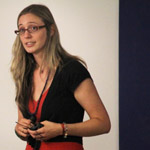Interview with Melanie Boly

This post-lecture interview was conducted during the BCBT Summerschool held at the Universitat Pompeu Fabra, Barcelona, september 2010.\xa0
Several theories of how the brain can produce consciousness have been proposed, amongst which the Global Workspace theory. Melanie Boly (Belgian National Fund of Scientific Research) approaches the evaluation of such theories from a clinical perspective: what can we actually measure and compare between patients that are in different states of consciousness? What differs, or correlates in terms of behavioral capabilities as well as brain functionality, between person in a vegetative state, in a coma, a minimally conscious state, or someone that is fully awake? The research of her team moved from looking from a global perspective on brain behavior and the connectivity involved with consciousness, towards a particular interest in the differences that occur in frontal and parietal brain areas. With Paul Verschure she discusses the need to aim multiple different approaches for the measurement of consciousness, like techniques combining clinical observation and physiology, towards similar theoretical paradigms. Especially for the appropriate diagnosis of a patient's state such questions are highly relevant, because it defines a meaningful terminology for indices, tags, and the associated levels of particular functionality.About the lecturerMelanie Boly is currently a Postdoctoral Researcher at the Belgian National Fund of Scientific Research and Neurologist in training at the University Hospital CHU Sart Tilman under Prof. Gustave Moonen. Her current research is on the assessment of cerebral responses to pain in individual non-communicative patients, and their relationships with the patients' behavioural responses as evaluated using standardized clinical scales.